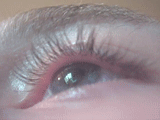Fasciculation
Editor-In-Chief: Prab R Tumpati, MD
Obesity, Sleep & Internal medicine
Founder, WikiMD Wellnesspedia &
W8MD medical weight loss NYC and sleep center NYC
| Fasciculation | |
|---|---|

| |
| Synonyms | N/A |
| Pronounce | N/A |
| Specialty | N/A |
| Symptoms | Muscle twitch |
| Complications | N/A |
| Onset | N/A |
| Duration | N/A |
| Types | N/A |
| Causes | Motor neuron disease, Peripheral nerve hyperexcitability, Electrolyte imbalance, Stress |
| Risks | N/A |
| Diagnosis | Clinical diagnosis, Electromyography |
| Differential diagnosis | Myokymia, Myoclonus, Tremor |
| Prevention | N/A |
| Treatment | Reassurance, Magnesium supplementation, Beta blockers |
| Medication | N/A |
| Prognosis | N/A |
| Frequency | Common |
| Deaths | N/A |
Fasciculation is a brief, spontaneous contraction affecting a small number of muscle fibers, often causing a flicker of movement under the skin. These involuntary muscle twitches are typically benign but can be associated with various neurological conditions.
Causes[edit | edit source]
Fasciculations can be caused by a variety of factors, including:
- Benign fasciculation syndrome
- Amyotrophic lateral sclerosis (ALS)
- Spinal muscular atrophy
- Peripheral neuropathy
- Myopathy
- Electrolyte imbalance
- Stress and anxiety
- Caffeine and other stimulants
Symptoms[edit | edit source]
The primary symptom of fasciculation is the visible twitching of muscles, which can occur in any voluntary muscle group. Common areas include the eyelid, calf, and thumb. These twitches are usually painless but can be annoying or concerning to the individual experiencing them.
Diagnosis[edit | edit source]
Diagnosis of fasciculations typically involves a thorough medical history and physical examination. Additional tests may include:
- Electromyography (EMG)
- Nerve conduction study
- Blood tests to check for electrolyte imbalances or other underlying conditions
- Magnetic resonance imaging (MRI) to rule out structural abnormalities
Treatment[edit | edit source]
Treatment for fasciculations depends on the underlying cause. In cases where fasciculations are benign, no treatment may be necessary. For other causes, treatment options may include:
- Addressing electrolyte imbalances
- Managing stress and anxiety
- Reducing caffeine and stimulant intake
- Medications for underlying neurological conditions
Prognosis[edit | edit source]
The prognosis for individuals with fasciculations varies depending on the underlying cause. Benign fasciculations generally have a good prognosis and do not lead to serious health issues. However, fasciculations associated with neurological diseases may indicate a more serious condition that requires ongoing management.
See also[edit | edit source]
References[edit | edit source]
Search WikiMD
Ad.Tired of being Overweight? Try W8MD's physician weight loss program.
Semaglutide (Ozempic / Wegovy and Tirzepatide (Mounjaro / Zepbound) available.
Advertise on WikiMD
|
WikiMD's Wellness Encyclopedia |
| Let Food Be Thy Medicine Medicine Thy Food - Hippocrates |
Translate this page: - East Asian
中文,
日本,
한국어,
South Asian
हिन्दी,
தமிழ்,
తెలుగు,
Urdu,
ಕನ್ನಡ,
Southeast Asian
Indonesian,
Vietnamese,
Thai,
မြန်မာဘာသာ,
বাংলা
European
español,
Deutsch,
français,
Greek,
português do Brasil,
polski,
română,
русский,
Nederlands,
norsk,
svenska,
suomi,
Italian
Middle Eastern & African
عربى,
Turkish,
Persian,
Hebrew,
Afrikaans,
isiZulu,
Kiswahili,
Other
Bulgarian,
Hungarian,
Czech,
Swedish,
മലയാളം,
मराठी,
ਪੰਜਾਬੀ,
ગુજરાતી,
Portuguese,
Ukrainian
Medical Disclaimer: WikiMD is not a substitute for professional medical advice. The information on WikiMD is provided as an information resource only, may be incorrect, outdated or misleading, and is not to be used or relied on for any diagnostic or treatment purposes. Please consult your health care provider before making any healthcare decisions or for guidance about a specific medical condition. WikiMD expressly disclaims responsibility, and shall have no liability, for any damages, loss, injury, or liability whatsoever suffered as a result of your reliance on the information contained in this site. By visiting this site you agree to the foregoing terms and conditions, which may from time to time be changed or supplemented by WikiMD. If you do not agree to the foregoing terms and conditions, you should not enter or use this site. See full disclaimer.
Credits:Most images are courtesy of Wikimedia commons, and templates, categories Wikipedia, licensed under CC BY SA or similar.
Contributors: Prab R. Tumpati, MD

